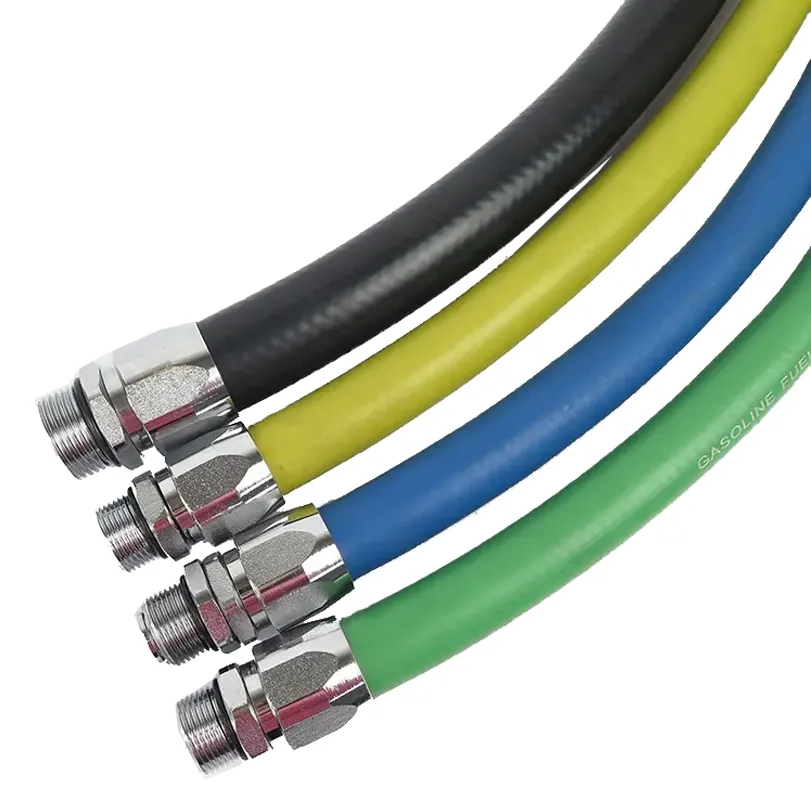335345435
apr . 24, 2025 09:20 Terug naar lijst
Gasoline Hose: A Complete Guide to Safe and Efficient Fuel Transfer
When it comes to transferring gasoline, whether for automotive, industrial, or agricultural purposes, using the right hose is crucial for safety and efficiency. A benzine slang is specifically designed to handle the unique challenges of fuel transfer, including resistance to chemicals, flexibility, and durability. In this guide, we’ll explore the importance of a benzine slang, the benefits of a flexible gasoline hose, and why a gasoline resistant hose is essential for safe fuel handling. Whether you’re a professional or a DIY enthusiast, this guide will help you choose the right hose for your needs.

What is a Gasoline Hose?
A benzine slang is a specialized tube designed to transport gasoline and other petroleum-based fuels safely. These hoses are constructed from materials that resist the corrosive and degrading effects of gasoline, ensuring long-lasting performance and preventing leaks or spills. They are commonly used in fuel dispensing systems, automotive applications, and industrial fuel transfer operations.
Importance of a Gasoline Hose
Using the right benzine slang is critical for several reasons:
Safety: Gasoline is highly flammable, and a leak or rupture in the hose can lead to dangerous situations. A high-quality hose minimizes this risk.
Durability: Gasoline can degrade certain materials, but a gasoline resistant hose is designed to withstand prolonged exposure without cracking or weakening.
Efficiency: A properly functioning hose ensures smooth and efficient fuel transfer, reducing downtime and improving productivity.
Compliance: Many industries have regulations governing fuel transfer equipment. Using an approved benzine slang helps ensure compliance with safety standards.
Benefits of a Flexible Gasoline Hose
A flexible gasoline hose offers several advantages, making it a popular choice for various applications:
Ease of Use: The flexibility of the hose makes it easy to maneuver, even in tight or hard-to-reach spaces.
Reduced Kinking: Flexible hoses are less prone to kinking, which can restrict fuel flow and damage the hose over time.
Versatility: These hoses can be used in a wide range of applications, from fueling vehicles to transferring fuel between storage tanks.
Durability: Despite their flexibility, these hoses are built to withstand the rigors of fuel transfer, including exposure to gasoline and environmental conditions.
Why Choose a Gasoline Resistant Hose?
A gasoline resistant hose is specifically designed to handle the corrosive nature of gasoline and other fuels. Here’s why it’s essential:
Chemical Resistance: These hoses are made from materials that resist degradation caused by gasoline, ensuring long-lasting performance.
Prevents Leaks: A resistant hose maintains its integrity even after prolonged exposure to fuel, reducing the risk of leaks or spills.
Safety: By preventing degradation, a gasoline resistant hose minimizes the risk of hose failure, which can lead to dangerous situations.
Cost-Effective: While these hoses may have a higher upfront cost, their durability and reliability make them a cost-effective choice in the long run.
Applications of Gasoline Hoses
Gasoline hoses are used in a variety of applications, including:
Automotive: Fueling vehicles, transferring fuel between tanks, and connecting fuel lines in engines.
Industrial: Transferring gasoline in manufacturing plants, warehouses, and other industrial settings.
Agricultural: Fueling farm equipment, such as tractors and harvesters.
Marine: Fueling boats and other watercraft.
Emergency Services: Fuel transfer in emergency response vehicles and equipment.
Key Features to Look for in a Gasoline Hose
When selecting a benzine slang, consider the following features:
Material: Look for hoses made from materials like nitrile rubber, which offer excellent resistance to gasoline.
Flexibility: A flexible gasoline hose is easier to handle and less prone to kinking.
Pressure Rating: Ensure the hose can handle the pressure requirements of your application.
Temperature Range: Choose a hose that can withstand the temperature conditions it will be exposed to.
Certifications: Look for hoses that meet industry standards and certifications for fuel transfer.
A benzine slang is an essential component for safe and efficient fuel transfer. Whether you need a flexible gasoline hose for easy handling or a gasoline resistant hose for long-lasting performance, choosing the right product is crucial. By understanding the different types of hoses and their applications, you can ensure safe and reliable fuel transfer for your automotive, industrial, or agricultural needs. Regular inspection and timely replacement of your gasoline hose will help maintain safety and efficiency in your operations.
Gasoline Hose FAQs
Q1: What materials are used in gasoline hoses?
A: Common materials include nitrile rubber, which offers excellent resistance to gasoline and other fuels.
Q2: How do I know if a hose is gasoline resistant?
A: Look for hoses labeled as gasoline resistant or check the manufacturer’s specifications for chemical compatibility.
Q3: Can I use a regular hose for gasoline transfer?
A: No, regular hoses may degrade when exposed to gasoline, leading to leaks or failure. Always use a gasoline resistant hose.
Q4: How often should I replace my gasoline hose?
A: The lifespan of a hose depends on usage and conditions. Inspect it regularly for signs of wear, such as cracks or leaks, and replace it as needed.
Q5: Where can I buy a gasoline hose?
A: You can purchase gasoline hoses from online retailers, automotive supply stores, or specialized hose suppliers.
-
LPG Hose for Sale: A Wholesaler’s Guide to Sourcing Safe and Profitable Solutions
NieuwsJun.23,2025
-
Rubber Pipes for Sale: A Wholesaler’s Blueprint for Sourcing Premium Industrial Solutions
NieuwsJun.23,2025
-
Hydraulic Hose Wholesale: A Wholesaler’s Playbook for Strategic Sourcing
NieuwsJun.23,2025
-
Power Washer Hoses for Sale: A Wholesaler’s Guide to Smart Sourcing
NieuwsJun.23,2025
-
Hydraulic Fittings for Sale: A Wholesaler’s Guide to Mastering Compatibility and Compliance
NieuwsJun.23,2025
-
Hydraulic Pipe Crimper for Sale: A Wholesaler’s Guide to Sourcing Premium Crimping Solutions
NieuwsJun.23,2025



